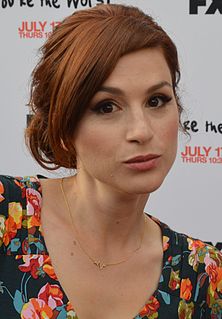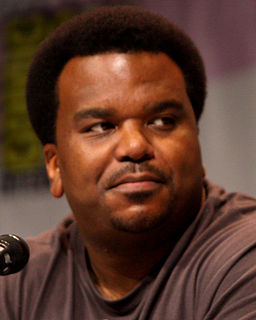A Quote by Albert Brooks
All improv turns into anger. All comedy improv basically turns into anger, because that's all people know how to do when they're improvising. If you notice shows that are improvising are generally people yelling at each other.
Related Quotes
I do a little improv in my shows. Kind of like our movie, I'll do beats and ideas of dialogue, but I think there's less pressure because it's a live show. If you mess up, the audience laughs because we don't really know what we're doing. But as far as shooting, that was very scary, trying to make a point and drive the film. It definitely helped improvising.
Anger makes people feel uncomfortable, because the minute somebody shows it, it puts you in a position where you can't laugh or make light of something... not to trivialise it I don't mean. But your reaction to anger is supposed to be fear or returned anger. So, you're really trying to control a situation when you show anger and it's a very weak position to take. It often works on people who aren't in a position to fight back.
And writing comedy and it really taught me how to kind of like craft jokes, it sounds like weird but really focus on crafting jokes and trying to make the writing really sharp. At the same time I did improv comedy in college, and that helped with understanding the performance aspect of comedy, you know, because it's different when you improv something vs. when you write it and they're both kind of part of my process now.
When anger is not trampling roughshod through our nervous system, it is sitting sullenly in some unspecified internal organ. "She's got a lot of anger in her," people will say (it nestles, presumably, somewhere in the gut), or, "He's a deeply angry man" (as opposed, presumably, to a superficially angry one). If anger isn't released, it "turns inward" and metamorphoses into another creature altogether.
Anger is generally seen as an unwelcome presence in our midst, however natural it may be. Although each person, and each society, is charged with how anger is to be appropriately channeled, the denial of anger, or its continuous repression, is a deep source of our psychopathology and will invariably seek its expression in a less healthful fashion.
There is nothing wrong with anger. Anger is a beautiful emotion, as valid and rich as joy or laughter. But you have been taught to repress your anger. Your anger has been condemned. If anger is unexpressed, it will slowly poison you. The key is to know how to express your anger. Do not throw it out onto any one. No one is responsible for your anger. Simply express your anger. Beat up a cushion. Go for a run. Express your anger to a tree. Dance your anger. Enjoy it.
I was on the improv team in high school, and after I graduated, I joined an improv company that had been established 10 years prior to me getting there. They did longform improv, and I fell in love with it. It's acting, character creation, collaborative, artistic expression and comedy - and it's scary. It was a big rush.
A puppet that starts to improvise badly is almost funnier than the puppet that's improvising well. So the show gets better when the improvising is really good, but also the show can also sometimes get better when the improvising sort of goes a little wrong and that's sort of a blessing to improvising with puppets.
I think with improv - and I say it all the time because it's become such a catch thing that you talk about improv - if the scene is well-written, you don't need to improv. But that being said, if something strikes you in the moment and, most importantly, you know where the scene is supposed to go, it's no different than method acting.




































